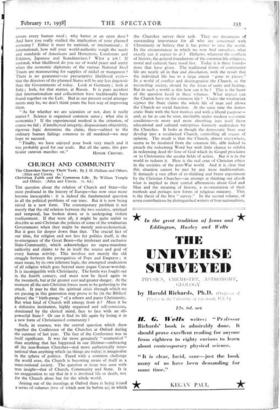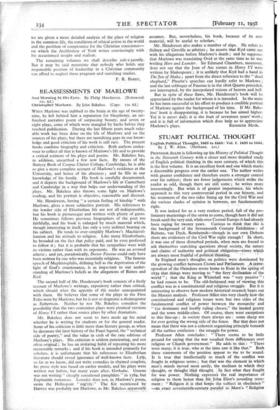CHURCH AND COMMUNITY
The Churches Survey Their Task. By J. H. Oldham and Others. (Allen and Unwin. is.) Christian Faith and the Common Life. By William Temple and Others. (Allen and Unwin. 7s. 6d.) Tim question about the relation of Church and State—the most profound in the history of Europe—has now once more become inescapable : it is indeed the fundamental question in all the political problems of our time. But it is now being raised in a new form. The contemporary problem is not merely that the old relation between the two societies, spiritual and temporal, has broken down or is undergoing violent readjustment. If that were all, it might be quite unfair to
describe as anti-Christian the policies of some of the totalitarian Governments when they might be merely anti-ecclesiastical. But it goes far deeper down than that. The crucial fact of our time, for religion and not less for politics itself, is the re-emergenCe of the Great Beast—the intolerant and exclusive State-Community, which acknowledges no supra-mundane authority and claims to be in itself the source and goal of every human activity. This involves not merely the old struggle between the prerogatives of Pope and Emperor ; it must mean, by its own inherent logic, the attempted eradication of all religion which goes beyond mere pagan Caesar-worship. It is inconiOatible with Christianity. The battle was fought out in the foUrih century, and must now be faced again in the twentieth, but at far greater cost and greater danger. At the moment all the anti-Christian forces seem to be gathering to the attack. It may be that the spiritual crisis through which we are passing in this generation may prove to be (in the Biblical phrase) the " birth-pangs " of a reborn and purer Christianity. But what kind of Church will emerge from it ? Must it be a defensive institution, highly organised and self-conscious,
dominated by the clerical mind, face to face with an all- powerful State ? Or can it find its life again by losing it in a new form of Christianised community ?
Such, in essence, was the central question which drew together the Conference of the Churches at Oxford during the summer of last year. The fact of the Conference was in itself significant. It was far more genuinely " ecumenical " than anything that has happened, in our lifetime—embracing all the non-Roman Churches—and more authentically inter- national than anything which (as things are today) is imaginable in the sphere of politics. Faced with a common challenge the world over, the Church is becoming aware of itself as a trans-national society. The question at issue was seen with true insight—that of Church, Community and State. It is no exaggeration to say that in it is involved life or death, not for the Church alone but for the whole world.
Arising out of the meetings at Oxford there is being issued a series of volumes (two of which now lie before us) in which
the Churches survey their task. They are documents of outstanding importance for all who are concerned with Christianity or believe that it has power to save the world. In the circumstances in which we now find ourselves, what exactly can it expect to do? Hitherto, whatever the conflicts of history, the general foundations of the common life, religious, moral and cultural, have stood fast. Today it is these founda- tions that have given. The traditional forms of community life are nearly all in flux and dissolution, with the result that the individual life has to a large extent gone to pieces." In a world of conflict and disintegration the Church, as the reconciling society, should be the focus of unity and healing. But in such a world as this how can it be ? This is the heart of the question faced in these volumes. What impact can the Church have on the common life ? Under the totalitarian regimes the State claims the whole life of man and allows the Church no social function. At the same time the demo- cratic State with the best motives and with a liberal purpose— and, as far as can be seen, inevitably under modern economic conditions—is more and more absorbing into itself those educational and cultural enterprises formerly undertaken by the Churches. It looks as though the democratic State may develop into a secularised Church, controlling all organs of opinion. The result is that the Church, almost everywhere, seems to be insulated from the common life, able indeed to preach the redeeming Word but with little chance to exhibit in redeeming deed th°: love of God which its Gospel proclaims or to Christianise the secular fields of action. But it is in the world to redeem it. Here is the real crux of Christian ethics in the societies of the post-War world. And it is clear that this situation cannot be met by any mere traditionalism. It demands a vast effort of re-thinking and brave experiment by the Christian Churches—an attempt at thinking out afresh what is implied in their central affirmations about God and Man and the meaning of history, a re-orientation of their methods and perhaps new forms of religious ministry. This is the thesis of the first " survey." In the second volume, of seven contributions by distinguished writers of four nationalities,
we are given a more detailed analysis of the place of religion in the common life, the conditions of ethical action in the world and the problem of compromise for the Christian conscience— on which the Archbishop of York writes convincingly with his accustomed insight and realism.
, The remaining volumes we shall describe sub,: e iuently. But it may be said meantime that nobody who holds any responsible position of leadership in a Christian community can afford to neglect these pregnant and searching studies.
F. R. BARRY.



















































 Previous page
Previous page